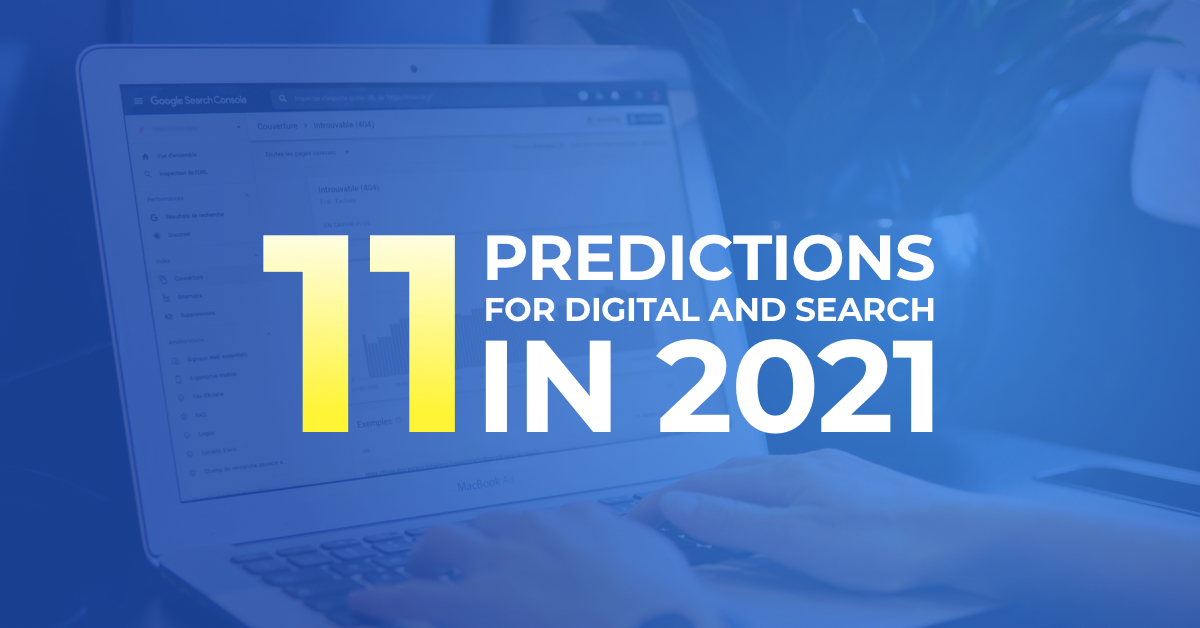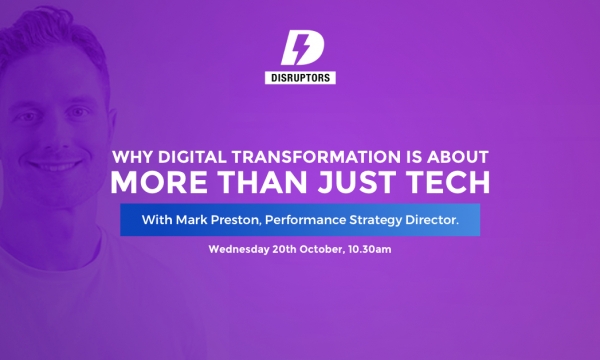As we head towards 2021, there is a lot that we can learn from the last twelve months. But just how much will that shape how marketers and consumers behave in the coming year? We asked the Stickyeyes team for their views on what they think will be the big talking points.

SEO gets elevated into the experience

Glen Conybeare, Managing Director
Search marketing, particularly SEO, has always suffered from a lack of appreciation. How many CMO’s sit down with their team and say, “Right, priority number one is SEO”. Very few.
However, what CMOs are often heard extolling is the importance of customer experience. “Fanatical about customer experience”, “customer-orientated organisation”, “audience-first business” – stop me if you’ve heard any of these before.
The good news is clients, and indeed agencies, are starting to appreciate that SEO, in its broadest sense, is all about customer experience. It’s just how you approach it.
Imagine our CMO is part of a large DIY chain and challenges his team, “Our customer experience for people who want to design their own kitchens isn’t good enough. Potential customers can’t find us, and when they do it’s not clear what we are offering, the overall experience is poor”.
Who takes ownership of this challenge? The Head of UX?, Content?, web design/development?, SEO?
The answer should be all of the above, and indeed when SEO is done properly it encompasses all these services. The right approach to solving the problem is: SEO understand the search landscape – what are people searching for? What are the most important terms? What sites currently do well? Content, UX and SEO wireframe the new page(s), SEO input to the content brief before it’s created and finally, design and build create it with technical SEO best practices baked in.
Approach the problem in this way and customer experience is improved throughout the funnel.
The lesson here is twofold. Firstly, SEO can play a fundamental part in creating good customer experience and secondly customer experience starts from the moment potential customers start searching for any terms that the brand could and should own.
Brand marketers need to keep an eye on Amazon

Sarah Barker, Head of Biddable Media
2020 is probably the year that nobody predicted. And as it turns out, it was the year of Amazon. As people in lockdown took to online shopping, Amazon was unsurprisingly one of the big winners (at least judging by its third quarter results).
But what we did see in 2020, particularly around key retail periods like Black Friday and Cyber week, is that Amazon’s visibility in paid search has actually reduced year on year. And this isn’t just a one-off phenomenon – clients who resell via Amazon have reported similar observations over the course of the past year.
The news that Amazon is being less competitive might seem like good news on the face of it, not least for your Google Ads CPCs but, it isn’t a sign that Amazon is backing down. In fact, it’s a sign that Amazon is so confident about it’s dominance in the retail sector that it now expects users to go straight to the app or website, bypassing Google entirely.
And this is likely to be just the precursor. There are signs that Amazon is already starting to step outside its traditional box with the Explore BETA, and I think we can expect more of this to come – challenging other digital platforms in new ways.
My advice, if I was charged with running a brand’s ad strategy, is to keep a close eye on what Amazon does next when deciding where to invest my budget.
We’ll all just forget what we’ve learnt from 2020

Lisa Wisniowski, Brand Communications Director
I really hope I’m wrong with this one but, once things return to ‘normal’, it’s quite possible that we (the general public), and therefore marketing teams will forget the challenges of 2020 and revert to type.
We’ve all heard about brands going back to basics this year, about being more emotive, and about being aware of the general sentiment of the nation. Don’t get me wrong, Team Stickyeyes loved Tesco’s “No naughty list” and the lesser known but equally brilliant “Take Care of Yourself” from German online pharmacy, Doc Morris but, we’ve seen it all before. The world was going to be a different place after we all pledged to ‘Be Kind’ to others, the environment and our future but, it wasn’t long after that the world had moved on. Brands pushing for profit at the expense of their staff’s financial future and/or the environment was the messaging that is still making headlines as we leave 2020 behind.
Whilst my point is relevant to more than just marketing campaigns, I hope the way brands conduct themselves with their staff, suppliers and customers has more of a positive impact on successful business outcomes as we start what will hopefully be a more positive year ahead.
The “annual planning meeting” will hopefully change for the better

Michael Hewitt, Content Marketing Manager
We’ve all been there right? That moment, usually any time towards the end of Q3 or beginning of Q4, where the invitation lands in the inbox. That’s right; it’s time for the annual marketing team pilgrimage to an off-site conference room where we plaster the glass walls in post-it notes and flip charts as we debate and decide what we’re going to do in the next arbitrary twelve month period.
And as January comes and we bound into the office (remember those?) bursting with ideas, full of hope and armed with a strategy that we think will be the key to success in the coming year.
Yeah, how did that work out?
I think 2020 has shown us the folly in this cycle of “annual planning”, where marketing strategies and tactics seemingly change (sometimes for no other reason than for changes’ sake) with the passing of a new year. Because for all of the chaos that 2020 brought, there was a lot that didn’t actually change. Consumers kept on buying stuff, advertisers kept on advertising and marketers kept on marketing.
For many of us, whatever was planned in those meetings toward the back end of 2019 went completely out of the window by March, but we kept doing what we do. So what are those annual planning sessions actually for?
What worked for most brands in 2020 was good, fundamental marketing strategy that focused on what consumers wanted, and the truth is that for the most part, our consumers don’t change that much from year to year. They’re largely the same people, looking to fulfil largely the same needs in largely the same way, so why do we meet up every year and talk amongst ourselves as if they do?
In 2020 it seemed that necessity, rather than being the mother of invention, was instead the mother of simplicity. Marketers went back to basics. They focused less on the shiny new things and short-term tactics and instead, they spent more time thinking about the long-term importance of brand and more of stuff that mattered – the stuff that endures far beyond the scope of an annual planning session.
How many people wrote that on their post-it note?
Content expertise more important than ever

Shane Gladstone, Senior Lead Writer
Google E-A-T (Expertise, Authoritativeness and Trustworthiness) put the emphasis on content authored by experts. This continues in 2021 with the arrival of the more recent December 2020 Core Algorithm Update.
Google continues to favour pages that present relevant and authoritative content to searchers.
Brands should put their experts front and centre. Interview product specialists and transform their words into industry magazine-style content that answers your audience’s search questions. Research and reference your articles with the fastidiousness of a national newspaper subeditor or university academic.
Failing that. Find an agency that can.

Graham Matthews, Lead Writer
2020 was the year we all turned to the experts – for constant COVID advice, political insight and so much more. Ever since the EAT update, the use of experts in content creation has been vital through writing, reviewing and using author bios to demonstrate expertise and authority.
That remains the case – especially across the medical, legal and financial sectors. But in 2021 it could take on an even greater importance. We’ve already seen Facebook and Twitter starting to add disclaimers and flag content shared across their social media platforms that could spread misinformation. While Google is unlikely to follow suit, it still has the power to knock pages way down the SERPs that it doesn’t see as a legitimate source for the topic being discussed.
It’s not just Google that cares about where articles and information are sourced from either. In the era of ‘fake news’, consumers and advice seekers are all double-checking where their content comes from. Brands and bloggers need to make sure more than ever that they know what they’re talking about, have the authority to do so and can back it all up with strong sources.
Brands will need to be human more than ever

Scott Malthouse, Head of PR
We’ve experienced a paradigm shift in 2020, with not only the shape of our social lives being turned upside down, but also in the way marketing has had to shift its messaging. Right at the start of the pandemic we saw brands either pull back on their earned marketing output entirely, understandably concerned about putting a step wrong during a tumultuous time, or quickly refreshing their marketing to meet the dreaded “new normal”.
Just like things won’t go back to normal as soon as Auld Lang Syne is sung (in a socially-distant manner), nor will digital PR return to its pre-pandemic status. During 2020 the media craved fun, light-hearted and warm stories to combat the constant dire messaging around COVID, and this will likely continue throughout the new year. Brands will need to show their human values more than ever if they want to cut through – it’s not enough to rattle through the usual brand talking points. Softer stories that resonate with a public who are finding their way back to normal are going to be winners with the media.
Digital transformation will drive brands to rethink how they solve key challenges

Lee Allen, SEO and Technical Director
Throughout 2020 the pandemic forced many businesses to react and deliver quicker, with remote working capabilities firmly dictating the direction. Those at the forefront of solving these issues were largely technology providers.
The industry seamlessly closed gaps to accommodate large-scale, digital transformation requirements, to meet customer’s new needs and capitalise on the increased demand for digital services. Now brands have adapted their mindset, especially those who taken this opportunity to drive cost efficiencies, they’ll undoubtedly carry this digital-first mindset forwards to 2021 onwards.
Such shifts have naturally increased trust between client and service provider, demonstrating work that may have previously been delivered in-house, can be better delivered by third parties or purely autonomously. Moving in to 2021, I’d expect many businesses to consider platform or outsourced solutions where they may have typically looked to build or hire, respectively, while the technology providers will quicken speed of deployment, with a larger focus than ever on the online-first consumer mentality.
A podcasting rebirth

Stephanie Gathercole, Senior Writer
During lockdown, the closure of live event spaces left many entertainers and creatives without an outlet from which they could earn their living. As a result, many of them moved into radio and podcasting.
The discussions and chat that happen on podcasts have proven to be a great way to create talking points and a sense of community. I know that personally, I had never listened to a podcast until lockdown and they’re something I’ve been getting into more and more as we’re still unable to get out to see a live show or have an in-person chat with friends and family.
With the popularity of podcasting having something of a rebirth during lockdown, we’re seeing more clients look at ways they can use this particular format in their campaigns. As we move into 2021, we all hope that things will start to return to a type of normal we all recognise, but it’s likely that this will take a while and that many people will feel a little nervous about returning to live events right away.
So, it stands to reason that podcasts will continue to fill this gap in our lives and create a sense of discussion and community that may have been lost in the last year.
Less fluff, more stuff

Fatima Banglawala, Senior PR and Social Media Executive
The media appetite has been an ever-changing beast throughout 2020; from the COVID-19 pandemic and Black Lives Matter, to the US election and the ongoing developments around Brexit. It’s been a year of serious events that have impacted everyone, all over the world, and because of this, we’re going to see more brands heavily link their marketing efforts to what’s making the headlines.
With more people consuming their news on social media, it’s going to be more important for brands to avoid appearing tone-deaf (or worse) – see how Volkswagen’s attempt at using a popular social media trend backfired amid claims of racism, for one of the more extreme examples.
With the spotlight shining on brand messaging now more than ever, we’ll find that more marketing efforts will be heavily tied to the serious stuff, rather than light fluff.
Emerging search

Mark Butler, Content Editor
In a year when very little has been business as usual, neither has the search or keyword landscape.
As people scrambled to Google terms like ‘r number’ and ‘social distancing’ in the spring of 2020, we also experienced a huge shift in transactional norms as consumers migrated, many for the first time, to ecommerce.
Supermarkets saw unprecedented demand for online grocery shopping, people turned to online banking for the first time and consumers bought up whatever stock there was of gym equipment, bicycles and comfy slippers.
But there’s nothing like a radical and unprecedented impact to highlight something that’s always been true.
The fact is that search is not constant. It is not set in stone. It evolves and shifts over time, with some terms falling out of fashion and others rising to prominence. This is the challenge that marketers need to meet in the coming year.
In 2021, expect more attention to be placed on identifying notable shifts in search behaviour from consumers, with companies looking to understand more thoroughly how these habits are evolving, what it is that customers and the public in general are looking for – and what new functional and informational patterns may be most relevant to their sector.
Building the new normal or a return to home comforts

Jonathan Brown, Senior Content Editor
As coronavirus starts to hopefully fade from our lives, we’ll see people and businesses across the world head in one of two directions – some will crave the normality they enjoyed before. Others will look to take the learnings of the past year and build something new.
This will be the same in the digital world. Many brands will be fundamentally changed by the pandemic and will build on that to create a new approach to content, PR, and marketing. This could be how they communicate with customers, the tone of voice in their content, or a whole new business model that will need the content to back it up. This will probably be most clearly seen in businesses that have moved solely online and how they will need to create websites that reflect this new normal.
Others will want to return to safe ground – but probably (hopefully) with a positive spin. So expect big, celebratory campaigns in the summer, a focus on live events again and a general celebration of life. Businesses will be reaching out to their customer base more than ever.
Attribution comes into sharper focus

Tom Johnson, Account Manager
After a tough year for many brands, most companies will be looking to rely on the channels that show a strong direct return on investment. That presents an opportunity for those with a more advanced attribution model to steal a march through channels at the top of the digital funnel.
The brands that are investing in brand awareness and prospecting to new audiences will continue to pull away and steal more market share, whereas others will look to improve their level of reporting to unlock additional digital spend in the future.


